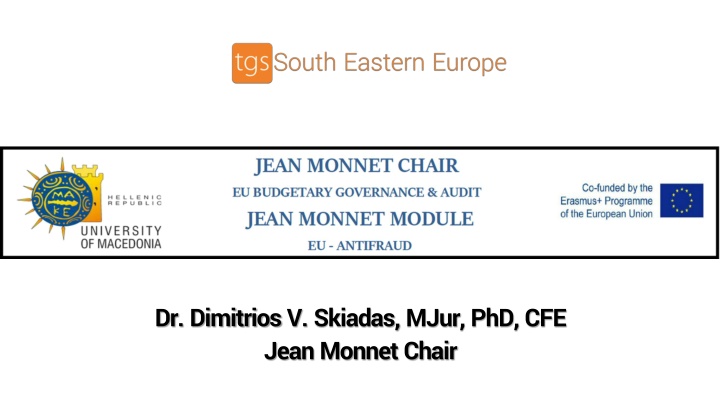
Whistleblower Protection Directives and Laws in Europe
Discover the key highlights of the EU Directive No. 2019/1937 regarding whistleblower protection, along with details on the transposition of the directive in Southeast European countries such as Romania, Greece, Bulgaria, Cyprus, Croatia, and Slovenia. Learn about the varying compliance start dates, minimum number of employees, and the specific laws implemented in each country. Furthermore, explore the absence of whistleblower laws in certain non-EU Southeast European countries like Turkey and the existing whistleblower protection laws in Serbia, Albania, and North Macedonia.
Download Presentation

Please find below an Image/Link to download the presentation.
The content on the website is provided AS IS for your information and personal use only. It may not be sold, licensed, or shared on other websites without obtaining consent from the author. If you encounter any issues during the download, it is possible that the publisher has removed the file from their server.
You are allowed to download the files provided on this website for personal or commercial use, subject to the condition that they are used lawfully. All files are the property of their respective owners.
The content on the website is provided AS IS for your information and personal use only. It may not be sold, licensed, or shared on other websites without obtaining consent from the author.
E N D
Presentation Transcript
Dr. Dimitrios V. Skiadas, MJur, PhD, CFE Jean Monnet Chair
Highlights of the EU Directive No. 2019/1937 The EU Legislation introduces (at the very minimum): Provisions for the protection of whistleblowers who report breaches of EU Law, Obligation to appoint a designated Whistleblowing Officer responsible for receiving and managing reports, as well as multiple reporting channels, Obligation to implement appropriate technical and organizational measures to ensure confidentiality, data protection, and security The Directive also provides for criminal sanctions and monetary fines for non- compliance.
Transposition of the EU Directive in Member States in Southeast Europe Compliance Start Date Minimum no. of Employees Name of Law Additional Information In addition to entities required to implement a WB System, the National Integrity Agency (ANI) is empowered to collect and manage whistleblower reports from the public Entities between 50 to 249 employees are required to be fully compliant by 17 December 2023 Entities with more than 250 employees are required to be compliant by 11 May 2023, while those between 50 to 249 employees are required to be fully compliant by 17 December 2023 The Law entered into force on 4 May 2023, but a prolonged implementation period extending to 17 December 2023 is envisaged for some private sector employers having between 50 and 249 employees Law no. 361/16.12.2022 on Whistleblower Protection for the Public Interest 31.01.2023 17.12.2023 Romania 50 The Greek Whistleblower Law (4990/2022), a transposition of the EU Directive 11.05.2023 17.12.2023 Greece 50 04.05.2023 (original) 17.12.2023 (prolonged) Bulgaria Bulgarian Whistleblower Law of 02.02.2023 50 Original whistleblower framework was introduced into the Labor Law in 2016. New Whistleblowing Law passed on 04.02.2022 The Act on the Protection of Persons Reporting Irregularities (Official Gazette No. 46/2022) 04.02.2022 17.12.2023 (prolonged) Entities between 50 to 249 employees are required to be fully compliant by 17 December 2023 Cyprus 50 23.04.2022 17.12.2023 (prolonged) Entities between 50 to 249 employees are required to be fully compliant by 17 December 2023 Croatia 50 Entities between 50 to 249 employees are required to be fully compliant by 17 December 2023 Entities with >10 employees and engaged in activities related to environmental managementandprotectionalsoneedtohaveaWBSysteminplace 22.02.2023 17.12.2023 (prolonged) The Reporting Persons Protection Act of 27.01.2023 Slovenia 50
Whistleblowing Laws in Some of the Non-EU SEE Countries Turkey Serbia Albania North Macedonia There is no Whistleblowing Law in Turkey. Organizations are not required to establish a Whistleblowing System or reporting channels. The Serbian Law on the Protection of Whistleblowers entered into force on 4 December 2014. The Albanian Law 60/2016 on the Protection of Whistleblowers entered into force in 2016. The North Macedonian Law on the Protection of Whistleblowers entered into force in November 2015. Since June 2015, all entities with more than 10 employees are required to establish a Whistleblowing framework, procedure and reporting channels. All entities with more than 10 employees are required to set up a Whistleblowing Rulebook and appoint a Whistleblowing Liaison Officer to whom employees can report. The law also allows whistleblowing reports directly to the competent authorities. This law establishes rules on whistleblowing on a suspected corruption act or practice by whistleblowers in the public and private sector, the mechanisms for the protection of whistleblowers and the obligations of public authorities and private entities related to whistleblowing. Employees are required by the Turkish Labor Law to report irregularities to their superiors or HR. If they witness criminal acts, they are required to report them to the authorities. The law providesfor the protection of whistleblowers against retaliation and discriminatory acts. Whistleblower protection is given under the Turkish Labor Law. Special protection is offered to heath and safety officers that report irregularities. The law providesfor the protection of whistleblowers against retaliation and discriminatory acts, as well as the protection of the personal data of the whistleblower. A whistleblower is provided protection under this law for reporting a suspected corruption act or practice in good faith. There are personal data protection requirements in Serbia covering the personal data of the whistleblowers. The local data protection law resembles the EU GDPR framework.






















